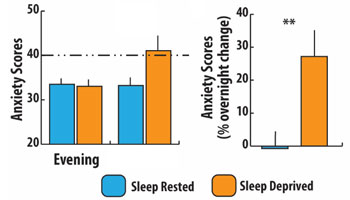Chronically anxious? Deep sleep may take the edge off
Extreme angst is on the rise nationally and globally, especially among teens and millennials. Among other factors, preliminary findings from UC Berkeley sleep researchers point to a chronic lack of deep restorative sleep.
 Investigating the neural link between sleep and anxiety, UC Berkeley neuroscientists Matthew Walker and Eti Ben Simon are finding that non-Rapid Eye Movement (NREM) sleep plays a key role in calming the overactive brain, especially in the brain regions that process and regulate emotions.
Investigating the neural link between sleep and anxiety, UC Berkeley neuroscientists Matthew Walker and Eti Ben Simon are finding that non-Rapid Eye Movement (NREM) sleep plays a key role in calming the overactive brain, especially in the brain regions that process and regulate emotions.
“The more time you spend in deep non-REM sleep, the less anxious you are in the morning,” said Ben Simon in reporting her preliminary findings at the Society for Neuroscience annual meeting this week in San Diego.
Using functional Magnetic Resonance Imaging (fMRI), among other measures, Ben Simon and Walker tracked the anxiety levels and brain activity of 18 healthy young adults, first during and after each participant enjoyed a regular night of sleep, and next after the same study participants stayed awake for 24 hours.
Each morning, study participants viewed emotionally evocative video clips while inside a brain scanner so that researchers could observe changes in their emotional brain activity after a night of no sleep.
 In the evenings, researchers found nearly identical anxiety levels across all the participants. However, after a night of no sleep, study participants reported a 30 percent increase in anxiety compared to the way they felt after a good night’s sleep.
In the evenings, researchers found nearly identical anxiety levels across all the participants. However, after a night of no sleep, study participants reported a 30 percent increase in anxiety compared to the way they felt after a good night’s sleep.
Moreover, brain scans taken as sleep-deprived participants watched video clips in the morning showed increased activity in such emotion centers as the amygdala “fight-or-flight” reflex, while the medial frontal cortex, which helps temper emotional responses, was virtually shut down.
As for study participants who benefitted from a full night of sleep, those who enjoyed longer periods of non-REM deep sleep reported the lowest levels of anxiety the next morning and showed the least emotional reactivity.
“A good night of deep non-REM sleep can benefit us in terms of anxiety and emotional regulation,” said Ben Simon, a postdoctoral fellow in Walker’s Center for Human Sleep Science at UC Berkeley.
One U.S. adult in five is estimated to have been diagnosed with an anxiety disorder, a mental health category that includes panic disorder, post-traumatic stress disorder, obsessive-compulsive disorder and generalized anxiety disorder, and up to 80 percent of anxiety patients complain about poor or disturbed sleep.
Add to that an epidemic in which one U.S. adult in three fails to get the recommended nightly eight hours of sleep, and a connection between sleep and anxiety emerges, Walker points out.
On a positive note, Walker says, “Deep sleep provides a nocturnal soothing balm, taking the sharp edges off our lives and lowering our anxiety. It’s a form of nocturnal therapy that many of us shortchange in this modern era of insufficient sleep.”
Final results of a study by Ben Simon and Walker on the neural link between sleep and anxiety disorders are forthcoming.
